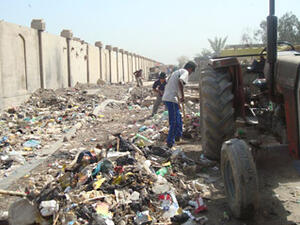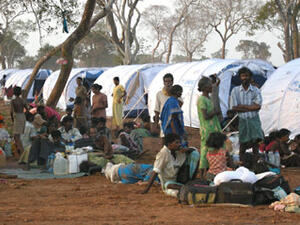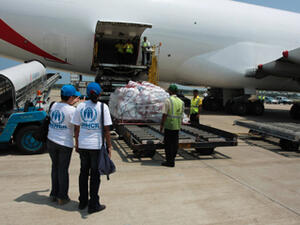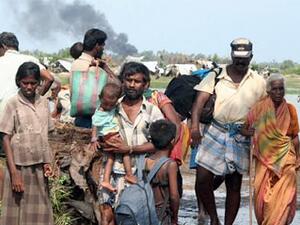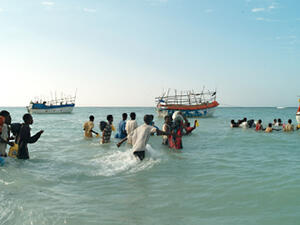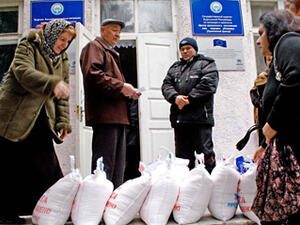Afghan development aid "a must" for 2003
Afghan development aid "a must" for 2003
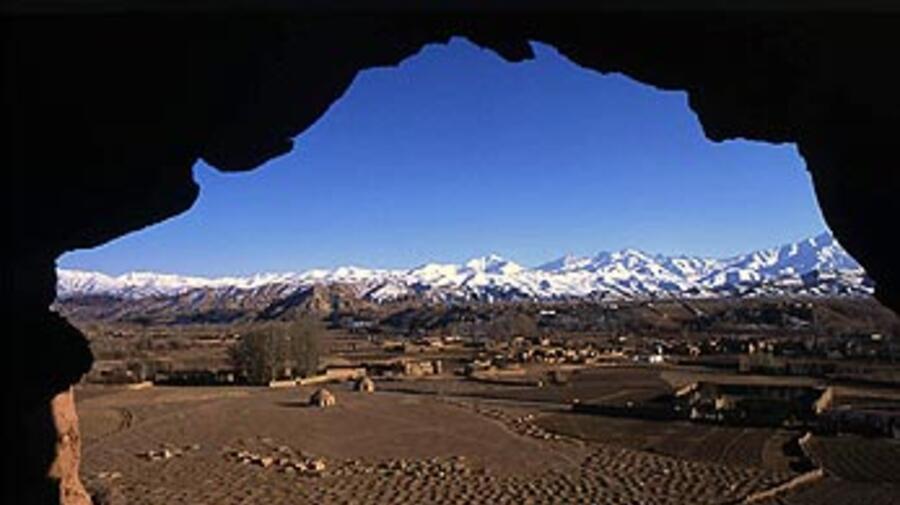
The view of the Bamiyan plain from the caves which shelter uprooted Afghans.
GENEVA, Dec. 19 (UNHCR) - The UN refugee agency's top official in Afghanistan, Filippo Grandi, warned today that a lack of adequate funding could put at risk the planned return to Afghanistan next year of more than 1.5 million people uprooted by the war.
Addressing a news conference in Geneva, Grandi said that immediate progress in development and reconstruction as well as better security were key to the success of the international effort to put Afghanistan back on track.
"2003 has to be the year of development and reconstruction," Grandi said, emphasising that the gains achieved so far by the internationally-backed Afghan government must not be squandered.
Grandi just returned from a meeting in Oslo of the Afghanistan Support Group comprising donor states and Afghanistan's neighbours. Donors at the Oslo meeting promised Afghanistan $1 billion in aid for next year. UNHCR told the meeting it needed $195 million to handle the return of uprooted Afghans and to help those who remain in the neighbouring countries.
Grandi praised the Karzai government's efforts to improve security and the rule of law in a country that for many years saw little other than war and destruction. It is important to "establish an army for the rule of law, rather than the rule of the warlord," he said.
But he said that despite government efforts and the presence of soldiers from the International Security Assistance Task Force (ISAF), security problems were still a major concern both for the people of Afghanistan and aid agencies who try to help them, especially outside of the capital.
"We are concerned that the situation will be difficult [during 2003], as ISAF is still confined to Kabul, while UNHCR is mostly [operating] outside of Kabul," Grandi said. "Despite dramatic improvements in security nationwide, it is a situation of multiple insecurity."
But the official acknowledged that hundreds of relief officials working in Afghanistan were safer today than at any other time in the last 25 years.
He said that Afghanistan still faced factional fighting in the north-west of the country, as well as in Paktia and Khost provinces and in Shindand District in the west. The US-led military coalition was still involved in anti-terrorist operations in the south-east of Afghanistan, as well as in Uruzgan and Kunar provinces. He noted that lawlessness remained a concern in some areas, and that the danger of terrorist attacks against foreign aid workers was still there.
Grandi warned that a shift of international focus from Afghanistan to Iraq and elsewhere should not come at the expense of the country's long-term development needs.
"I am just worried that resources will be taken away from Afghan reconstruction," he said. "The [Coalition] operation began as an investment in security, and for that investment to succeed, development aid must flow."
The UN refugee official said that donors must remain focused on developing Afghanistan to ensure that the repatriation over the next few years of more than 4 million Afghans still outside their homeland remains sustainable.
More than 1.8 million Afghan refugees have returned from Pakistan and Iran since the refugee agency began offering repatriation assistance last March, while more than 230,000 internally displaced Afghans have returned to their home areas. During the same time, another some 400,000 Afghans returned on their own without seeking international help.
Next year, UNHCR is planning to help 1.2 million refugees to return home mainly from Iran and Pakistan. It will also assist some 300,000 internally displaced people in going back to their original communities.




